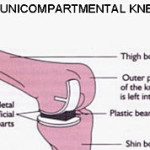A total knee replacement is a surgical procedure whereby the diseased knee joint is replaced with artificial material. The knee is a hinge joint which provides motion at the point where the thigh meets the lower leg. The thigh bone (or femur) abuts the large bone of the lower leg (tibia) at the knee joint. During a total knee replacement, the end of the femur bone is removed and replaced with a metal shell. The end of the lower leg bone (tibia) is also removed and replaced with a channeled plastic piece with a metal stem. Depending on the condition of the kneecap portion of the knee joint, a plastic “button” may also be added under the kneecap surface.… Read the Rest
Tag Archives: post op recovery
Eagle Rock’s Total Hip Replacement Video
Apr 14, 2012?? Just showing how good I am after 3 days,there are no problems,the pain is very low and I should be back to normal in a few weeks. I hope my little videos are of some encouragement if you are having a TKR. Its natural to feel anxious,its all over very quickly and you will soon be home and enjoying pain free knees ! My surgery was performed at the Horder Center Crowborough Sussex UK they specialise in joint replacement and in my opinion could not perform any better,its first class service from surgery to the meals department all the staff try their hardest to see you are well looked after in your own room with bathroom ,TV ,nice windows and restful d??cor.… Read the Rest
Losing or Gaining Weight Affects Recovery
(New York, NY. March 14, 2014) While many overweight patients intend to lose weight after joint replacement, a study by Dr. Geoffrey Westrich at Hospital for Special Surgery finds that although some patients are able to accomplish this goal, equal numbers of patients actually gain weight after hip or knee replacement. Researchers also determined that patients’ success in managing their weight after surgery affects how well they do two years down the road.… Read the Rest
Pros and Cons of Simultaneous Bilateral TKR
By??Nilesh Patil, MS(Orth); Hemant Wakankar, MS, FRCS, Mch(Orth), FRCS(Orth)
ORTHOPEDICS 2008; 31:780
August 2008
Total knee arthroplasty (TKA) is an effective treatment for end-stage arthritis of the knee. Published studies in the literature have consistently reported TKA as an efficacious and cost-effective means of alleviating pain and restoring function.1,2 A significant number of patients with severe end-stage degenerative joint disease have symptomatic bilateral knee joint affliction, necessitating joint replacement in both knees.3-5 The surgical options available for these patients include a staged procedure with a certain time interval between 2 procedures, simultaneous arthroplasty of both knees using 2 surgical teams, or bilateral arthroplasty using 1 team with the patient under 1 anesthetic. However, the decision to perform bilateral knee arthroplasty staged or simultaneous is debated.… Read the Rest
Limb lengthening common TKR
April 2008
SAN FRANCISCO – Patients typically experience an increase in limb length after undergoing total knee arthroplasty, according to a study presented here…
…Jason E. Lang, MD, and colleagues investigated changes in limb length occurring after TKA performed in 102 knees of 98 patients…
…Overall, 82 of the 102 knees (80.4%) experienced an increase in limb length after surgery, including 77% of the varus group and 86% of the valgus group…… Read the Rest
Two-stage protocol for infection after TKA
A two-stage treatment protocol and intravenous antibiotics may help surgeons effectively manage infections after total knee arthroplasty, according to a Texas surgeon.
Richard E. Jones, MD, said during his presentation at the 9th Annual Current Concepts in Joint Replacement Spring Meeting, “All in all, we can say that the two-stage technique gives us good delivery of antibiotics, helps clean up infections, maintains soft tissue length and enhances rehabilitation and joint restoration.”… Read the Rest






